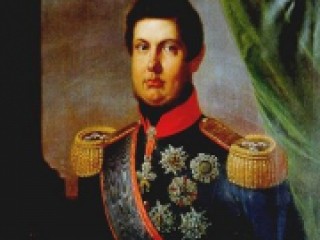
Ferdinand II Of Two Sicilies biography
Date of birth : 1810-01-12
Date of death : 1859-05-22
Birthplace : Palermo, Sicily
Nationality : Sicilian
Category : Historian personalities
Last modified : 2011-05-14
Credited as : King of the Two Sicilies, House of Bourbon,
Ferdinand II was king of the Two Sicilies from 1830 to 1859. He stoutly resisted Italian liberalism and independence movements. His bombardment of Sicilian cities earned him the nickname of King Bomba.
Born in Palermo on Jan. 12, 1810, Ferdinand II was the son of the future Francis I and the grandson of the violently anti-revolutionary Ferdinand I, both of the Bourbon line of Naples. His mother was the Spanish Infanta Maria Isabel. When Ferdinand ascended the throne of the Southern Kingdom in 1830, it was hoped that he might head up an attack on reaction from within Italy and the domination of Austria from without Italy. His first marriage was to Christina of Savoy, daughter of Victor Emmanuel I of Piedmont, the only other Italian monarch capable of resisting Austrian pressure. His reign began with an amnesty of political prisoners. He refused to sign a treaty of alliance with Austria, and he worked out a foreign-policy orientation toward France. However, Christina died in 1836 (having given birth to the last of the Bourbon line, Francis II), and with his marriage to the Austrian archduchess Theresa, Ferdinand instituted a new policy of repression at home and of friendship with the Hapsburgs.
Ferdinand put down insurrections in Sicily and Calabria in 1844; but with the revolutionary movement of 1848 the former province declared its independence. In Naples, Ferdinand instituted a constitutional monarchy, patterned on that of the 1830 July Monarchy in France. According to the constitution of January 29, there was to be a bicameral legislature and civil liberties. The constitutional movement spread to the rest of Italy and, spearheaded by Piedmont, the Italians launched their First War of Independence against Austria.
Ferdinand had contributed troops to the war effort. They were recalled after further radical activity at Naples, which resulted in the revocation of the new constitution. On May 15 the new Parliament convened, only to be immediately dispersed. (The constitution was formally discontinued on March 13, 1849.) Sicily was reconquered, and Ferdinand contributed troops to the crushing of the last Roman Republic. The savage repression which followed the defeat of the liberals had by 1850 earned Ferdinand the condemnation of the British liberal statesman William Gladstone, who described Ferdinand's regime as "the negation of God erected into a system of government."
The restoration of the old regime in the south by no means put an end to conspiracies and uprisings against Ferdinand, and there was an assassination attempt on the King's life in 1856. However, by the time Ferdinand died at Caserta on May 22, 1859, the Risorgimento (Italian unification movement) was well under way.
















